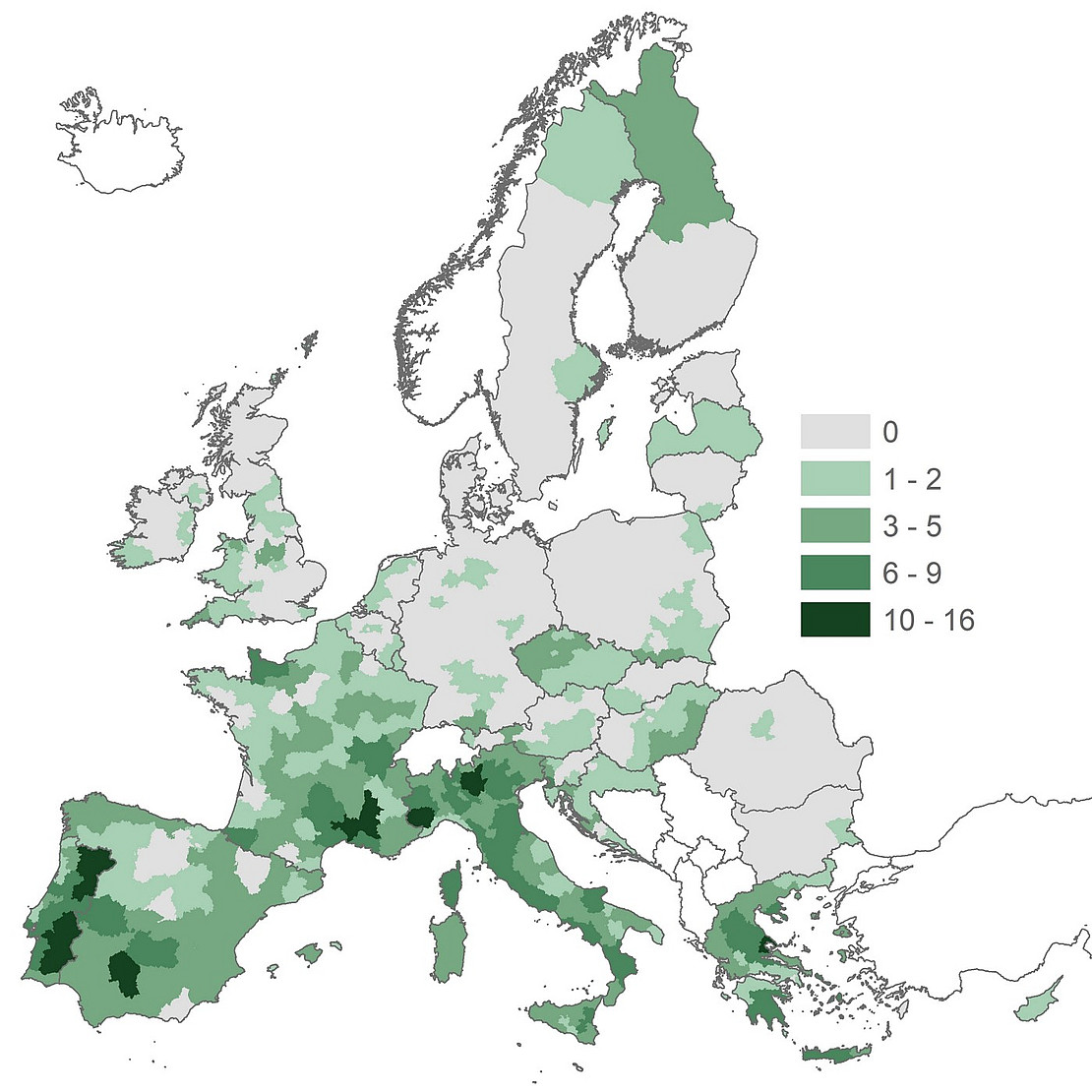This page contains automatically translated content.
EU Regionality Label as a Flagship of Cultural Landscapes

The so-called PDO seal stands for a geographically "protected designation of origin" and has been awarded by the EU since 1992 according to strict quality standards to protect and promote regional agricultural products. A research team from the Universities of Kassel and Göttingen, together with colleagues from Leipzig and Lisbon, has now mapped all 638 PDO-protected food products in the EU.
This resulted in an overview of the distribution of these products within the EU, as well as a so-called PDO score ("PDO score" in the English-language publication), which indicates how many PDO products are registered in a given region of Europe.
"Besides the obvious result that more than 80% of all PDO products are found in the eight countries bordering the Mediterranean Sea, we were nevertheless surprised that certain hotspots of PDO production stood out so clearly," said Lukas Flinzberger, a doctoral student in the Socio-Ecological Interactions in Agricultural Systems research group. "Along the border between Spain and Portugal, in southern France, northern Italy and the central mainland of Greece, individual regions exist where more than nine PDO-labeled products may be produced."
Relationships between PDO products and socio-ecological values.
In order to make statements about the relationships between PDO products and socio-ecological aspects, data on 13 socio-ecological indicators were collected in the regions concerned, including information on Natura 2000 areas, tourist accommodation sites or the average age of the population. Differences between Mediterranean and other European countries, as well as between the four main product categories, were also examined.
"Particularly noteworthy are the strong correlations between the frequency of PDO products and high nature value (HNV) agricultural areas, as well as the diversity of different land cover types," reports Prof. Tobias Plieninger, head of the department. In addition, there seems to be a clear link between tourist and cultural attractiveness (including the presence of UN World Heritage Sites) and the production of PDO products. "In turn, socio-economic indicators show that PDO production plays a much greater economic role in Mediterranean countries, and is explicitly linked to a positive employment situation there," adds Flinzberger. However, he adds, as elsewhere in Europe, higher levels of PDO production are also associated with aging and migration from rural areas. "This effect is even more pronounced in Mediterranean countries."
Based on the results, three conclusions could be drawn:
- PDO products are often produced in regions with high environmental and cultural value, but at the same time suffer greatly from negative demographic and economic trends.
- For this reason, the survival of traditional production methods may be at risk, as the areas concerned are often at an economically motivated crossroads between intensification of agriculture, or abandonment of use.
- The PDO label should therefore be used as a tool for sustainable development of European agriculture and rural life.
A path to sustainable food systems
PDO-labeled products must be produced (almost) entirely in the respective region and therefore have comparatively short value chains: "Traditional production methods can often be used to produce high-quality food that is profitable for local producers*," says Lukas Flinzberger. "All this suggests that PDO-labeled practices can contribute to sustainable land use and food production."
To ensure and improve product sustainability, the researchers suggest a review of all currently registered products ("PDO fitness check"), as well as highlighting the sustainable, extensive production systems of many animal-based PDO products in line with the "less but better meat" movement. In addition, it seems imperative to continue research at the case study level to bring meaning to the correlations shown.
Full Paper:
Flinzberger, L., Zinngrebe, Y., Bugalho, M.N., Plieninger, T. (2022a). EU-wide mapping of 'Protected Designations of Origin' food products (PDOs) reveals correlations with social-ecological landscape values. Agron. Sustain. Dev. 42. DOI: https://doi.org/10.1007/s13593-022-00778-4
Flinzberger, L.; Cebrián, M. A.; Peppler-Lisbach, C & Zinngrebe, Y. (2022b). Why Geographical Indications Can Support Sustainable Development in European Agri-Food Landscapes. Front. Conserv. Sci. DOI: https://doi.org/10.3389/fcosc.2021.752377
Contact:
Lukas Flinzberger
PhD student in the field of socio-ecological interactions in agricultural systems
lukas.flinzberger[at]uni-goettingen[dot]de
Tobias Plieninger
Head of the Department of Socio-Ecological Interactions in Agricultural Systems
plieninger[at]uni-kassel[dot]de
More info on the research blog People - Nature - Landscapes: